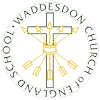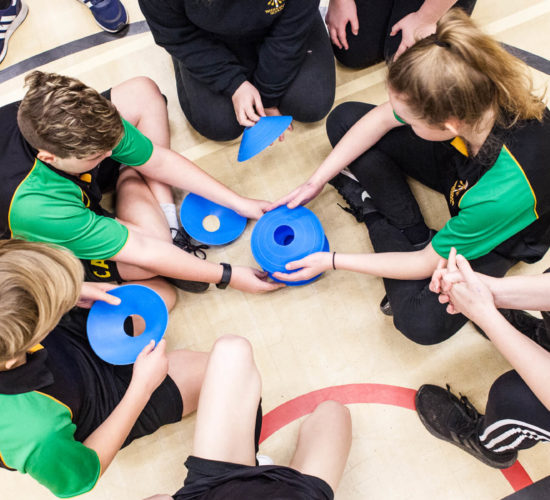
Our daily routines and educational practice are rooted in the twin values of Dignity and Respect.

Citizenship and PSHE (Personal, Social, Health and Economic education) at Waddesdon Church of England School provide a vital foundation for the personal development of young people preparing them for adult life.
Citizenship at Waddesdon School gives students a voice, an opportunity to learn about local, national and global issues and forms the basis for transition to life as an adult. It promotes spiritual, moral, social and cultural development, enabling students to become more self-confident and responsible both in and beyond the classroom. It encourages students to play a positive part in the life of their school, neighbourhood, community and the wider world. It also teaches them about our economy and democratic institutions and values, encouraging respect for different national, religious and ethnic identities, and developing their ability to reflect on issues and take part in discussions.
PSHE equips children and young people with the knowledge, understanding, attitudes and practical skills to live healthy, safe, productive, fulfilled, capable and responsible lives. The delivery of PSHE enables children and young people to become effective at navigating life transitions, learning in a positive way, understanding healthy relationships, considering career choices, and managing their future finances effectively. Through PSHE we aim to develop confident young people who are able to make the most of their abilities and to live a life which maintains personal dignity and respect towards others.
Mrs Bonita BridgesSubject Leader for CP |
Mr Matthew AbbottCP Teacher |
Miss Oliver NilanCP Teacher |
Ms Vanessa ClarkCP Teacher |
Mr Matt DippleCP Teacher |
Mr Janek MaciejewskiCP Teacher |
Mr Israr MohammedCP Teacher |
Teaching in Citizenship and PSHE provides students with key and important information delivered in a way which maximises engagement. It requires an approach that is active and emphasises learning by doing, thinking and reflecting in groups and individually. Students are encouraged to think for themselves using critical thinking skills, thus ensuring that students are able to participate fully. Discussions, debates and participation in school and community life enable students to understand the link between Citizenship, PSHE and their role as a citizen.
Citizenship and PSHE can help with students’ personal development in the following ways:
Citizenship and PSHE lessons are timetabled at Key Stage 3 and 4 and form a substantial part of the Key Stage 5 Employability Award programme and Enrichment programme.
Citizenship and PSHE is currently delivered to all year groups by a dedicated team of staff. This specialist team take an active role in the monitoring, evaluation, teaching and learning of the programme to the standards required. Staff are experienced in delivering a wide range of topics included in the programme. Their passion and expertise in their specialist subject is linked to the delivery of the programme.
Relationship and Sex Education (RSE) and Health Education (HE)
As a secondary school, we provide RSE and HE to all students as per section 34 of the Children and Social Work Act 2017 and DfE statutory guidance (first published June, 2019).
Curriculum Provision RSE and HE are taught via subject-specific programmes of study and within the personal, social, health and economic (PSHE) education curriculum. RSE content is mainly delivered via PSHE lessons for Years 7-11, assemblies, guest speakers and form time. Biological aspects of RSE and HE are taught within the science curriculum, and other elements are included in religious education (RE).
RSE focuses on giving young people the information they need to help them develop healthy, nurturing relationships of all kinds, including:
HE focuses on opportunities for teaching students about problems and challenges, including more serious mental and physical health conditions such as substance and alcohol misuse, with a focus on providing information about effective interventions.
Themes include:
Students will be taught how to judge when they or someone they know needs support and where they can seek help if needed.
RSE and HE topics are delivered through the Citizenship and PSHE programme, supported by assemblies, form time, successful learning sessions and seminar-style learning, involving guest speakers and external professionals.
Careers education at Waddesdon is delivered across all year groups. Lessons and activities take place in PSHE lessons and are also linked to other subjects, assemblies and form time activities to enable students to experience a wide range of careers education learning. School visits in other subjects are also linked and highlighted to enable students to see the link between workplaces and future opportunities.
Every term students have a collapsed CP lesson, Successful learning run by the leadership team. These sessions ensure students have the skills and values to succeed through exams and beyond their life at Waddesdon by exploring values and non-cognitive skill and increasing community and connectedness. Students are explicitly taught how to make informed choices, how to condense and memorise notes, and how to make good habits.
RSE and HE Delivery AuditStudents are taught the following topics in Year 7:
Students are taught the following topics in Year 8:
Students are taught the following topics in Years 9:
Students are taught the following topics in Years 10:
Students are taught the following topics in Years 11:
The following topics are covered in Extension Studies, year group assemblies and form times:
___________________________________________
The following topics are covered in year group assemblies, form times and additional activities at breaktimes and after school:
Citizenship and PSHE lessons are not graded for the purpose of exams because students do not sit exams in these subjects. Knowledge is built over a five-year period to enable students to learn about a wide range of issues in an age-appropriate way. A specialist team of staff teach the same block of lessons and are therefore able to assess students using a wide range of informal assessment methods. Self-reflection is a key element of Citizenship and PSHE and the most effective way of ensuring progress.
Some citizenship and PSHE lessons include assessment, or review sessions which enable students to consolidate their knowledge before moving on to a new lesson, discussion or topical debate.
Planned co-curricular activities further support students’ knowledge and understanding in Citizenship and CP. These include the Healthy Heart Project in Year 7 and The Model United Nations General Assembly in Year 10.
In addition, the role of Sixth Form student leaders enhances student knowledge and understanding in activities such as Peer Support and the ‘We Need to talk about Racism’, ‘community outlook’ and ‘Waddesdon way’ student leadership groups.
Events such as Remembrance Day and Holocaust Memorial Day draw attention to relevant national and global commemoration and the students’ active role in understanding these events.

Waddesdon Church of England School’s Assessment and Feedback Policy. At Waddesdon our aim is for assessment to be:
